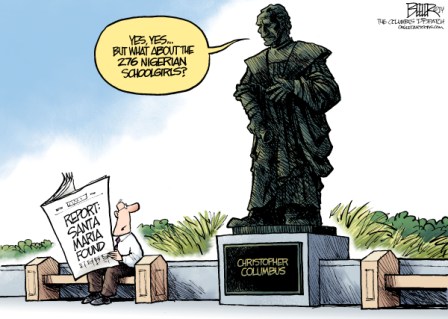Kidnappings in Nigeria
Over 200 Girls Taken from School by Islamic Terrorists.
On April 15, 276 girls, most aged 16 to 18 with many coming from Christian families reports the Washington Post, were abducted by Boko Haram, an Islamic terrorist organization in the Borno state of Nigeria. That day militants in trucks arrived at a girl’s boarding school in the town of Chibok, in the remote northeastern corner of the country. According to the Washington Post, these armed men rounded the girls up into their trucks and ransacked the building before driving off into the dense jungle that serves as Boko Haram’s hideout. Since then the BBC reported that 53 of the girls have escaped leaving 223 still in the clutches of their violent captors.
Needless to say Boko Haram’s actions have sparked international outrage, especially after Nigerian government officials continued to contradict themselves regarding how many girls were still missing. Many concerned citizens in Nigeria have protested the government’s slow reaction to the kidnappings. Across the globe thousands have taken to Twitter to express concern for the girls and demand that finding them be made a priority as part of the #BringBackOurGirls campaign.
On May 5, Boko Haram released its first video since the girl’s kidnapping. In the video the current leader of the Islamist group, Abubakar Shekau, threatened to sell the girls into slavery, and stated that these girls shouldn’t have been trying to get an education in the first place, but rather they should have been married. This video follows earlier reports from news agencies like the Washington Post that many of the girls were being sold as “wives” to the group’s fighters for the equivalent of $12.
The next day President Obama, the BBC reports, announced that the U.S. government would give Nigeria assistance in rescuing its stolen girls in the form of expert advisors. In addition, the U.S. has also been sharing satellite imagery with the Nigerian government and is conducting manned electronic surveillance flights. According to the Washington Post, the U.K. and Israel have also sent teams to aid Nigeria and France and China have also offered their assistance.
On May 11, the governor of the state of Borno where Chibok is located claimed to have intelligence regarding the whereabouts of the over 200 girls still in the hands of Boko Haram.
The following day the terrorist group released another video, this time including about 136 of the kidnapped girls. In the video they were wearing full lengths hijabs, which are scarves and/or cloaks that Muslim women often wear, and also recited verses of the Koran, Islam’s main religious text. Making another appearance was Shekau who offered to trade some of the girls in return for previously captured militants. According to the BBC, Nigeria’s Interior Minister Abba Moro called Boko Haram’s attempt at setting terms for negotiations “absurd.” The very next day Nigerian Cabinet Minister Tanimu Turaki, who heads a special committee with the goal of reaching agreement with Boko Haram, announced that his country’s government was willing to negotiate.
On May 27, Nigeria’s Chief of Defence Staff, according to the BBC, claimed that the Nigerian Army had found out where the girls were being held by Boko Haram. However he also said that they wouldn’t risk their lives by using force.
Who are These People?- Boko Haram, which literally means “Western Education is Forbidden” in the native Hausa language, is an Islamic radical group founded in 2002 by a Muslim cleric named Mohammed Yusef with the ultimate goal of creating an Islamic state similar to Afghanistan under the Taliban.
In 2009, after they made multiple attacks against various government buildings, the Nigerian government cracked down on Boko Haram, taking the groups headquarters, capturing and/or killing their supporters and fighters and killing Yusef himself, later televising his corpse.
In the wake of their founder’s death Boko Haram have only stepped up their game under the leadership of Abubakar Shekau. They’ve assassinated, ministers, policemen, politicians, and even other Islamic clerics, generally anyone who spoke out against them. They have also bombed everything from buses to churches and have pillaged a number of villages.
The Human Rights Watch reported in 2012 that since 2009 over 1,500 people have been murdered by Boko Haram. In March of this year they reported that the group had killed 700 people in the first two months of 2014 alone.
Many people believe that the violence coming out of Nigeria’s northeast will only end if the people can be educated and lifted out of poverty. Until then people around the civilized world wait for 223 teenage girls to be returned be home. As for what condition they’ll be in when and if they are returned, we can only hope for the best.

Ian MacLeod is a member of the class of 2016. He joined the Green Wave Gazette his freshman year and became the Associate Editor as a sophomore and Editor-in-Chief...


